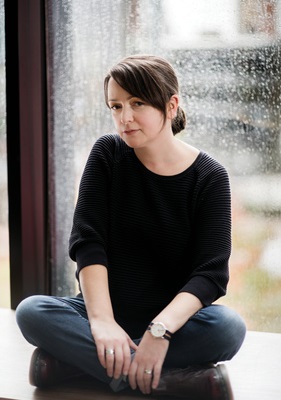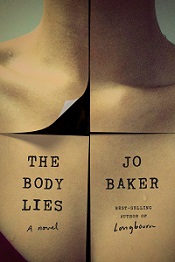A Conversation with Jo Baker, author of The Body Lies
A dark, thrilling new novel from the bestselling author of Longbourn: a work of riveting psychological suspense that grapples with how to live as a woman in the world—or in the pages of a book—when the stakes are dangerously high.

 |
Jo BakerPhoto © Jill Jennings |
A dark, thrilling new novel from the bestselling author of Longbourn: a work of riveting psychological suspense that grapples with how to live as a woman in the world—or in the pages of a book—when the stakes are dangerously high.
The editors at Knopf asked Jo Baker about what personal events inspired her to write The Body Lies and what she’d want someone to say about her book at a dinner party.
Q: In one or two sentences, what is The Body Lies about?
A: The Body Lies is about sexual violence and its aftermaths, about the imposition of one person’s will on another; about resistance, resilience and recovery. Told in intertwining narratives and conflicting voices, and it’s an exploration of the struggle to stay in charge of one’s own story.
Q: What compelled you to write this book?
A: The book emerged from a number of concerns.
I’d become troubled by the frequency of the ‘naked dead girl’ as a trope in fiction (including TV and film). I’d become troubled by the way in which this reduces women – actual persons, you know, with a rich inner life and full human agency – to silence, stillness and passivity. I’m troubled by the way that these same stories often serve to make women more afraid, and by the way in which they eroticize violence against women. It was important for me to push back against this. It was important to me that the narrator is herself a survivor of violence; she hasn’t been silenced or made passive by it and refuses to let a male voice tell her story; she shoulders her baggage, along with other peoples’, and lugs it on.
I also wanted to acknowledge that sexual violence is all too common. The statistics are such that there are women in any meeting or queue or office or coffee shop who have been subjected to it in some form. They might not be finding it easy, but they are getting on with things, day to day. I wanted to notice and celebrate the reality of female resilience, their continuing stories, that life goes on.
Q: Are any elements of The Body Lies inspired by or based on personal experience?
A: The book is rooted in my own experience of being assaulted, and the subsequent struggle to get back on track. My unintentional mantra in the aftermath was it could have been so much worse, and that is absolutely true, but I’m not sure that it was helpful. The assault may not have been as bad as it could have been, but it did change the way I live in the world: I haven’t really felt entirely safe since. I was out walking my dog when a passerby stopped me, talked to me. It took me a moment to realize what he was saying, because he was speaking so quietly. He was describing what he’d like to do to me. When I told him to shut up, he punched me in the face. I had a nasty bruise for a while, and a chipped tooth. It’s not the only experience I’ve had of unwanted attention, but it’s the only one that actually involved a physical attack.
Before the assault, I’d felt invulnerable; I’d felt like I could go anywhere, do anything – but afterwards I retreated; I felt stupid; I felt naïve, for having previously felt so at home in the world. I felt I understood the world better now, and felt less at ease in it.
Q: How does The Body Lies confront other portrayals of violence against women in fiction?
A: I’m ‘writing against’ fictions in which women’s accounts of assault or harassment are exposed as unreliable or manipulative. They’re not unusual – Mamet’s Oleannais probably the most celebrated example of this kind of narrative – but I had a few of them in mind while writing.
I’m interested but kept at arm’s length by these stories. I can see why they work the way they do – in order to play with expectations and shift the power around between characters. But I don’t feel that they reflect my experience, or that of my friends; I don’t recognize what’s depicted there as real. I wanted to tell a story that plays with expectations, and shifts the power around, but I also wanted to tell the truth. Or, at least, tell my version of it.
Q: What would you want someone to say about your book at a dinner party?
A: ‘The way her life gets kicked out from under her like that…’
‘Yeah but, it’s so common, isn’t it? The stats are like, one in four women, in their lifetime, and that’s just reported crime…? I mean, there’s four of us, four women sitting here now round this table.’
Glances. One woman grits her jaw. Another nods.
‘Yeah.’
‘It’s tough.’
‘Yeah it’s tough.’
‘But you get on with it, day to day; you just get on with it, don’t you.’
‘And that’s what the book’s about, ultimately, isn’t it? Endurance, and resilience? Like when, towards at the end, she has to – ’
‘No!’
‘What?’
‘Don’t spoiler me!’
‘Ha, sorry; where are you up to?’
‘When he sends her the piece he’s written, about that night.’
‘Eugh. Yes. That gave me the heebie-jeebies.’
‘Yeah he’s a piece of work.’
‘Okay, yeah, but, tell me this. With all those different voices, all those stories in the novel: can you really say that any one of them is actually telling the truth?’
‘Ah. Well… you’ll have to wait and see.’
 At once a breathless cat-and-mouse game and a layered interrogation of the fetishization of the female body, The Body Lies gives us an essential story for our time that will have you checking the locks on your doors.
At once a breathless cat-and-mouse game and a layered interrogation of the fetishization of the female body, The Body Lies gives us an essential story for our time that will have you checking the locks on your doors.
“An ingenious and electrifying setup that explores the boundary between fact and fiction . . . a gripping psychological thriller that combines fiendish mind games and riveting drama with a timely examination of male entitlement and female struggle . . . beguiling us, transporting us and terrifying us for good measure.”—Minneapolis Star Tribune
Want to start reading? Click to request an ARC of The Body Lies! While supplies last, US librarians eligible only.
SPONSORED BY
RELATED
ALREADY A SUBSCRIBER? LOG IN
We are currently offering this content for free. Sign up now to activate your personal profile, where you can save articles for future viewing










Add Comment :-
Comment Policy:
Comment should not be empty !!!
Rosemarie Borsody
I'm very troubled and annoyed at the constant barrage of women as victims in books, movies and TV-have been for some time now, so I was hooked after reading the author's first sentence. Absolutely interested in reading this.Posted : Jun 22, 2019 07:23